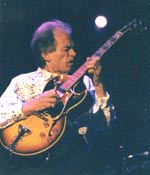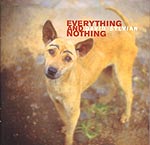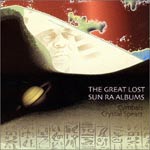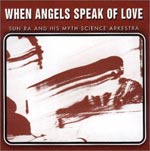GREATER THAN THE SUM OF THEIR PARTS | |

| I saw Steve Howe, best known as the guitarist in Yes, last night at Exeter Arts Centre, playing a mainly acoustic set of semi-classical and steel-string instrumentals. He was relaxed, talkative and stress-free - Devon is his home patch - and it was interesting to hear him discuss the music he likes, listens to and believes informs his playing: lots of jazz, country pickin' and blues. Interesting, because, Yes fan or not, I don't believe you would have a clue about the source material if you listened to any Yes album released over the last thirty years. So I was musing about what happens to the parts of things, how they mutate and change; or are mutated and changed by their context - in Howe's case, presumably, what happens when five band members get together to make progrock albums╔ I've also been wondering how Paul Morley managed to just about pull all the fragments of Nothing together in the end╔ Tangents readers will know I last mentioned Morley's book when I'd ground to a halt, and was pretty negative about the whole thing. Well, not being one to admit defeat I struggled on through the turgid middle section of the book, hoping it got better. 'Better' is the wrong word for a book about a father killing himself, but the final section of Nothing is when it all gets personal: Morley starts interviewing, or at least taping, his conversations with, his sisters and mother. Suddenly the book moves clearly into documentary, clearly defined non-fiction, and the missing subject is conjured up, in a fragmented and sometimes contradictory, manner. But everything that has gone before comes into focus, or rather the focus of everything that has gone before suddenly appears╔ It's a real sleight of hand and, like all the best tricks, I don't know how it's been done. I still think the book is way overlong and a bit self-pitying and self-obsessed in the middle; I also think that sneaking in a it-might not-really-be-true disclaimer about some of the Joy Division and Marc Bolan passages is a bit much; but I have to say it's a moving, interesting, almost-successful experiment Paul Morley has offered us. Changing our minds and rewriting the personal past is, of course, everyone's prerogative; but what about rewriting history, even pop history? I'm not so sure╔ and having now lived with the Magazine box set a few more weeks, I've come to the conclusion that someone - Howard Devoto? Virgin Records? - has been doing exactly that. Maybe it's right to be nervous now is a leaner, fitter version of the dream that was Magazine. It's dawned on me how few album versions of their output there are on this 3-CD set; and how nearly all of Play is present, along with the Peel Sessions and other live stuff. I still like it, I still stand by my earlier review, but what's interesting is that someone wants us to remember Magazine as a stripped back energetic live band╔ not the experimental studio experimenters we might regard them as if we simply listened to the four studio albums again. Well, they won't fool me! [Until I change my mind again, anyway.] |

| Perhaps it's okay to offer an alternative version? After all, the Magazine albums are still available - no-one has erased everything - but I find this constant 'bringing things up to date' a real weird place to be in and to listen to. [I know, no-one forces me to listen to, let alone buy, any of this stuff.] Robert Fripp re-released some King Crimson songs from the 70s a while back with new vocals by a different singer on; this strikes me as quite sad, as sad as the poets I know who have a body of work they are always revising and updating, instead of moving on and writing new work. Some things belong to certain eras, moments, times - should we be embarrassed by them, or allow that we were different people then? David Sylvian clearly isn't happy with some of the things he's done: 'none of the history books show me what I want to see' he sings early on his double best-of CD Everything and Nothing, which contains old songs of his with new vocals recently dubbed on, including 'Ghosts' - playing with one of your defining and most famous songs seems very silly indeed. So it's not a best-of really, more a kind-of wish-fulfilment. It's not a best-of because half of it is unreleased, many tracks from his last album's studio sessions, which Sylvian has only now seen fit to bother to finish or perhaps realised how good they are/were. Whatever the reasoning behind all this, Everything and Nothing is a beautiful collection of music and songs that gathers together tracks from not only solo outings, but Rain Tree Crow [a briefly-reformed Japan], Japan, Fripp & Sylvian, Marco Polo, an obscure Italian CD release, and a couple of Sakamota releases. 'Pop Song', a masterful and wrongly ignored twelve-inch from 1989 is finally on CD and remains, for me, his finest moment - an awkward almost-dissonant electric rhythm counterpoised with a gorgeous self-referential pop lyric and jagged piano. Also particularly remarkable are two 'Dobro' pieces worked up from the Bees on a Dead Cake sessions, and a previously unreleased fragment of Sylvian talking over Keith Tippett's improvised piano. Sylvian's grown-up version of himself is very persuasive, but he doesn't offer any of his glamboy musical growing-up [however naive, Japan made some great pop records well before Tin Drum was released], his ambient forays with Holger Czukay, or the wonderful collaborative pieces he has made with Hector Zazou. And there's very little of the noise and energy collaborators like Fripp have brought to his music; this, in the main, is intelligent AOR music that shuffles and seduces rather than dances or draws attention to itself. But maybe it's only my version of Sylvian that has him down as a repressed individual prone to over-production and pretentiousness, someone who is often rescued in the midst of these problems by the guitar of Robert Fripp, Marc Ribot or Bill Frisell, Keith Tippett's piano or Jon Hassell's trumpet? Whatever╔ |

| Sun Ra has been categorised in many ways by many people: avant-garde jazzer, big band leader, charlatan, lunatic, funkateer, noise-merchant, whatever╔ All somehow seem true if you only listen to particular albums or isolated tracks from his vast output. Which is exactly one of the problems: those who read, for instance, Thurston Moore going on about synth freakouts and then buy a Ra album to find big-band jazz on it will be disappointed; jazz fans faced with 30 minutes of vacuum-cleaner-sounding synthesizers will also not be pleased; those seeking funk-fusion will like neither. So it's strange that Evidence have just released a Su Ra CD entitled Greatest Hits: easy listening for intergalactic travel. Strange, because Ra never had any hits, but also because in my humble opinion these aren't the tracks I would use to entice people into Ra's musical world at all! The key is the 'easy listening' subtitle, although of course none of this is James Last territory. But languid blues, gentle space-funk, some big world bop, and some space-chants are what you get. But you get it all out of context, and unless you really only want a Sun Ra CD to put on in the background I'd leave this well alone. What is more interesting, and fills in historical discographical gaps which may mean a few things get reconsidered, are four other Evidence CDs, two containing two albums, which include three never-before released Sun Ra albums (although they've always been known about). Sun Ra's turbulent musical history is too long-winded to go into here - and there are various books about it around anyway - but the 70s found him signed to Impulse for a set of reissues of albums originally released on his own independent label, Saturn. In the end of course he got screwed by the majors, stuff was deleted and never-released, and the bargain bins were full of Sun Ra albums no-one wanted but that are worth gold dust now╔ [I'll spare you my middle-age angst about all the albums, Sun Ra and Anthony Braxton included, I could and should have bought in the Virgin Warehouse bargain basement in my youth.] Anyway, Cymbals and Crystal Spears are two of the previously released albums, and are collected here on an actual double CD self-consciously entitled The Great Lost Albums. Cymbals is great, blues-groove music with Ra mainly playing keyboards over the top; lots of percussion, too. A real gem. Crystal Spears isn't so hot, its far more reliant on the sort of improvisation that believes in repetition and abstraction, without really knowing where the music is going, or why. The twenty minute final track 'Sunrise in the Western Sky' is especially overlong. |

| The third unreleased album is Friendly Love, which is also the weakest. A long four-part meander through noise, dissonance and rinkytink keyboards it's not something I shall want to hear too often. but I will be listening to Pathways to Unknown Worlds which it shares a CD with, which is a glorious four-track album where structure and improvisation are exquisitely balanced: the music opens out into new territories, then is reined back in, only to wander off somewhere even more interesting. Noise and quieter interludes are juxtaposed, ensemble and soloing also╔ the sort of Sun Ra that all newcomers should hear. As are the final two releases, Lanquidity and When Angels Speak of Love. I've got tapes of both of these, but even so it's nice to have clean CD copies rather than second generation cassettes. Lanquidity is a funk album, a funk album from 1978, which to these ears shares Miles Davis' fascination and concern with tonal abstraction over tight grooves. The rhythm section here is astonishing, endlessly inventive; as are, of course, the soloists. The final track 'There Are Other Worlds' is a masterpiece of funk and studio production, with space voices low in the mix, entwined among the fragmented rhythms and echoing instrumental breaks. When Angels Speak of Love is from 1963, but you wouldn't know it. It sounds like Pink Floyd playing with Soft Machine and Charlie Parker, a glorious amalgam of gigantic echo and reverb counterpointed with space jazz-rock and funky percussion. Ra really did seem to get there first╔ and you really should check out as much of his music as you can and assemble your own version of how jazz and space music happened. © Rupert Loydell 2000 |